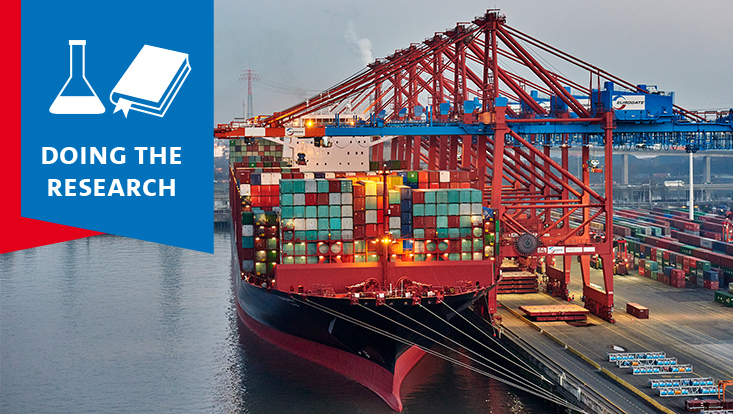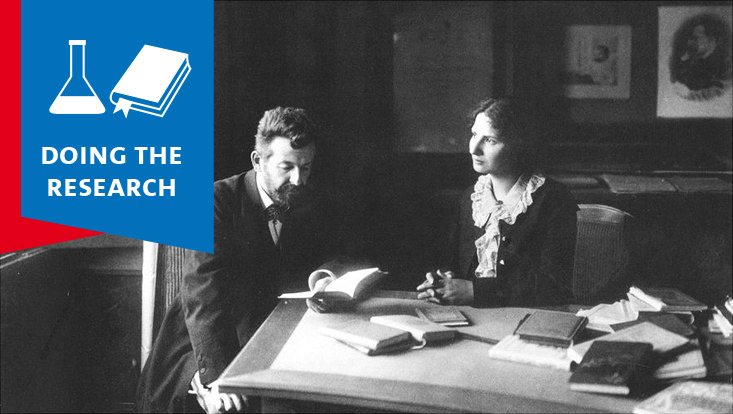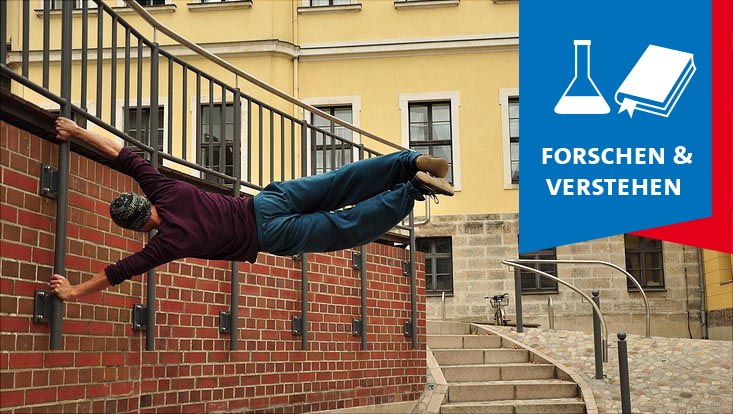TwinSim projectA Digital Twin for Hamburg’s PortDoing the Research series
25 August 2022, by Matthew Fennessy / Anna Priebe

Photo: EUROGATE/Vielmo
Hamburg’s harbor is the largest sea port in Germany and the third largest in Europe. Increasing costs and competition alongside climate protection concerns are creating major challenges. A research group at the Institute of Information Systems is now developing a digital twin for the port in its TwinSim project. Project head Dr. Leonard Heilig explains how this can help plan container terminals in more reliable and environmentally friendly ways. Our series Doing the Research introduces research projects at Universität Hamburg.
What is the focus of the project?
Basically, it focuses on the development of a digital twin—meaning the depiction of the physical properties of a container terminal and all its operations in the digital world. We are working together with the EUROGATE container terminal in Hamburg and gathering data on site, such as the position and speed of vehicles, which can then be visually depicted in 3D.
Information has to flow well in both directions: the digital twin should interpret received data and use them to make decisions. These, in turn, influence real objects and processes. For this to work, we use different technologies and methods such as sensors and artificial intelligence (AI).

How can a twin help, for example, with the challenges presented by global supply chains?
Container terminals are important hubs in global supply chains and they can quickly become bottlenecks. To make operations run more efficiently and in the long term, we need to make them more transparent. The use of modern technologies yields data with which we can precisely understand and steer equipment, infrastructure, activities, and procedures.
On the basis of these data, the digital twin can use simulations in combination with AI procedures to, on the one hand, analyze past operations and, on the other, make predictions so that in each and every situation plans and procedures can be adjusted. For example, if a ship is delayed, the impact can be analyzed pro-actively using a so-called “what-if analysis” and machine learning so that appropriate measures can be taken.
On the whole, this ensures better use of resources and we can reduce the negative ecological impact by, for example, avoiding empty shipments or adjusting speed. Operations between water and land can be improved in the long term, also taking into account the vicissitudes and problems in logistic chains.
We can ensure better use of resources and lower negative impact on the environment.
Port operations are, of course, highly complex. Does the project have a special focus?
Our research group is looking, first of all, at the simulation-based optimization of transport and storage operations in the container terminal itself. To do so, we first have to analyze procedures and rules at the terminal and depict these using simulation and optimization models in order to develop special procedures. We do not just use simulations of certain situations to analyze these procedures; we also compare them to other procedures that have already been used without intelligent planning.
Other foci are data analysis and the development and application of machine learning procedures. In this case, the concern is recognizing patterns and connections in the large amount of data created by the twin and which increases by the second so that we can derive findings and make predictions. One example is data on equipment, which is crucial to maintenance. These are regularly provided and we can analyze them using the digital twin, for example, to predict when a vehicle or container bridge cannot be used and to undertake preventive maintenance.
What is special about this project?
For me personally it is, above all, designing the digital twin, which involves combining different technologies, approaches, and procedures and thereby, hopefully, creating a useful tool to better address the various challenges posed by container terminals in the future. As a research group, we can use the entire scope of our expertise, learn by doing, generate knowledge, and ultimately make an important contribution.
What does knowledge exchange look like exactly?
The application and evaluation of the digital twin that we develop will first occur at the EUROGATE container terminal in Hamburg. The project, and especially our application-oriented research, is not simply self-serving; it should lead to a tool that can be put into operation daily to improve procedures.
To this end, it is important to have the later users, management, and board members involved and to regularly include them. At the start of the project we already held workshops with all of the players and developed procedures to document and evaluate the cases in which you would use the applications and the requirements in the various areas of the enterprise, especially in the different container terminals.
The knowledge gained in Hamburg’s port will be documented and made available. Later, further container terminals in the EUROGATE group will be equipped. Throughout the project, we will present interim findings internally or at trade fairs and conferences so that anyone interested can stay up-to-date while we foster discussion and stay agile with regard to newly arising requirements.
TwinSim project
The TwinSim project is a cooperation between the EUROGATE GmbH & Co. KGaA, KG, EUROGATE Technical Services GmbH, and akquinet port consulting GmbH. The application-oriented R&D project is being funded through Innovative Hafentechnologien (IHATEC), a program run by the Federal Ministry for Digital and Transport, in the amount of €3.5 million. The Institute of Information Systems (IWI) has be studying the development of information systems and quantitative methods for supporting decision-making in port and maritime traffic logistics for over 20 years. In numerous cooperation projects, it has contributed its findings to practical operations.
Doing the Research
There are approximately 6,200 academics conducting research at 8 faculties at Universität Hamburg. Many students also often apply their newly acquired knowledge to research practice while still completing their studies. The Doing the Research series outlines the broad and diverse range of the research landscape and provides a more detailed introduction of individual projects. Feel free to send any questions and suggestions to the Newsroom editorial office.


